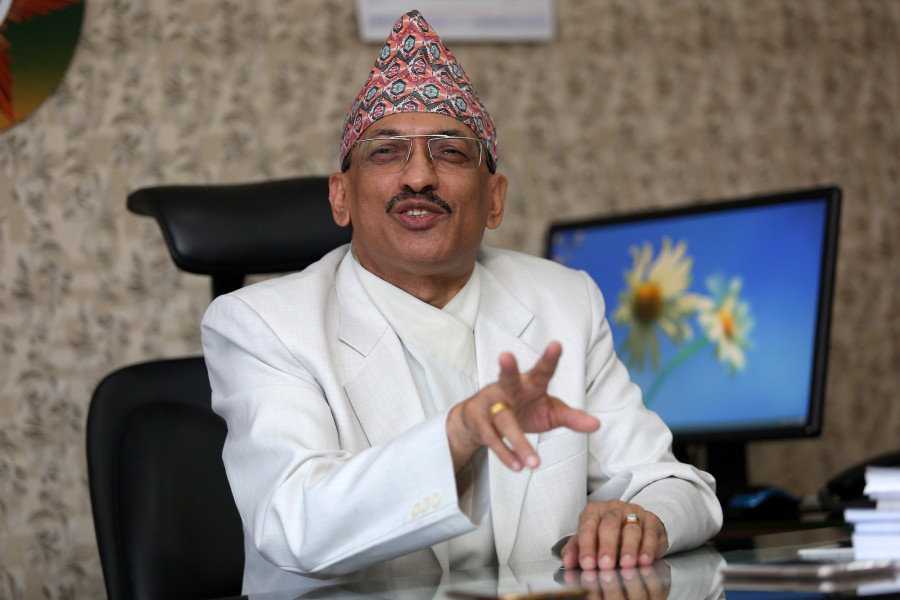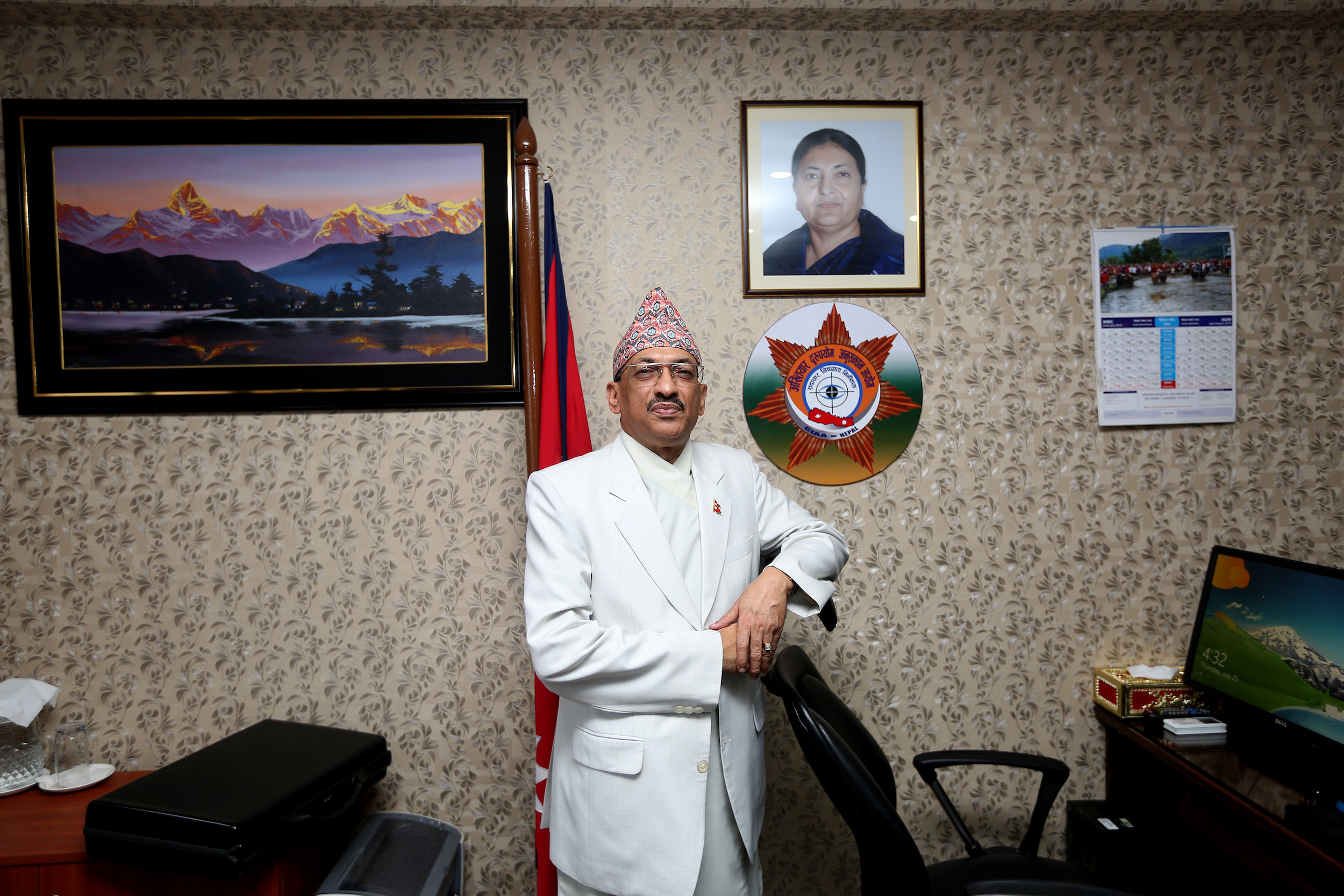Interviews
There’s no mechanism to deal with corruption in the private sector: CIAA commissioner
The head of the Commission for the Investigation of Abuse of Authority discusses the status of leading corruption probe cases—without actually saying much.
Prithvi Man Shrestha
Following his retirement from the post of Home Secretary, Nabin Ghimire was appointed to the Commission for the Investigation of Abuse of Authority as a commissioner on April 2, 2015. He went on to become acting chief commissioner in February 2018 and in September last year, he was appointed chief commissioner of the anti-graft body, which has been investigating a number of high profile cases. The Post’s Prithvi Shrestha recently spoke with Ghimire for a joint The Kathmandu Post-Kantipur Daily interview.
This interview has been edited and condensed for clarity.
There are reports that say political leaders enmeshed in the Lalita Niwas land scandal are leaving the country. Where is the CIAA in its probe at the moment?
A team led by a joint attorney is actively investigating the case. We have issued notices in the names of more than 89 people to come to the CIAA for interrogation. Some people connected to the land deals who abroad have already come into contact with us. We are currently interrogating government employees and searching for loopholes to establish linkages. The commission is committed to concluding the investigation as soon as possible.
Former prime ministers, including Madhav Kumar Nepal and Baburam Bhattarai, have also been connected to the scandal. Will they be interrogated?
I cannot say whether they will be interrogated as the case is still under investigation. We cannot say who is being interrogated and what their statements are. Former deputy prime minister Bijay Kumar Gachchhadar has publicly stated that he is ready to cooperate with the CIAA’s investigation. Other top figures have also assured us that they will cooperate. We will summon them if we have to.
There is a tendency to make controversial decisions through the Cabinet in the name of policy decision. How does the CIAA determine whether it is a policy decision or not?
The Supreme Court had given a verdict regarding a Cabinet decision under the late Girija Prasad Koirala that appears to say that the CIAA cannot investigate Cabinet decisions. We are studying that verdict. The CIAA has not investigated any Cabinet decision so far.
Does this mean former prime ministers cannot be interrogated in the land scandal case because it was a Cabinet decision?
We will analyse the legal issues surrounding this and take an appropriate decision. We have interrogated 18 to 20 people who were known as tenants in the case. During the interrogation, we found there is something wrong in Baluwatar land deal.
In the past, the CIAA investigated the Education Regulation passed by the Cabinet when Surya Nath Upadhyaya was chief of the commission. Doesn’t that mean the CIAA can look into cabinet decisions?
I already said that we will analyse the issue, including the verdict of the Supreme Court.
Is the Cabinet decision on Lalita Niwas a policy decision?
A proposal was made to the Cabinet to expand the area of the prime minister’s residence. The intentions behind the proposal are a different discussion. I cannot give my opinion on this.
If the Lalita Niwas scandal is taken to court, there are concerns over whether the political leadership will be indicted on corruption charges.
Time will tell what will happen. We have finished interrogating a few former ministers, including Chhabi Raj Pant and Dambar Shrestha, and are in the process of questioning others.
How do you rate your performance since you’ve been on the job?
I worked as acting chief commissioner for seven months and became chief commissioner last year. In the last fiscal year, we registered 351 cases at the Special Court, the highest number in the history of the CIAA. We conducted 142 sting operations, also a record high, bringing 200 public officials to book.
In order to increase the success rate of the cases we’ve filed at the court, we have focussed on addressing shortcomings in our investigation. For this, a completion examination committee has been formed, led by a joint attorney, which examines the investigation conducted by investigation officers.
In order to establish a corruption watch system, we’ve formed a rapid action taskforce, whose staff go to public offices posing as service seekers. The rise in the number of sting operation is also partly the result of the formation of this rapid action task force. We are also working on going digital—first by using less paper and then going paperless.
There is a perception that corruption is linked to politics. What is your view?
Corruption is largely connected with public procurement. The decision-maker during public procurement is usually the administrative leadership [bureaucracy]. If a politician has any links with that procurement decision, this happens behind curtains. We look at facts and investigate, and for anyone to be tried in court, those facts should prove that the politician has links with the decision-making process.
What is the main source of corruption?
There is a conflict between the system and the intention. Sometimes, intention overwhelms the system. In such a situation, corruption flourishes. In order to control corruption, our focus should be system-driven, instead of personality-driven. Our laws have been drafted in a way that it is more control-oriented, which delays decision-making. There is a lack of trust in those in power.

We often hear that the CIAA leadership comes under pressure from top politicians. As the commissioner, what kinds of pressure have you faced?
I am under no pressure. I was under a lot of stress when I had to take a corruption case against my own colleague to court. We have social relations, but duty comes before those relations. I have also taken corruption cases against my own relatives to court.
Is the CIAA investigating the Chhaya Centre, which is alleged to have been built over public land?
There has been an initial investigation on the issue of the Chhaya Centre, but it has not entered the detailed investigation phase.
What about other major cases, like the Hyatt Regency, where the government’s stake was reduced dramatically, and the widebody aircraft scandal?
The case is under detailed investigation.
Why is it taking so long to conclude the investigation into the controversial land purchase deal by the Nepal Oil Corporation?
It is still under investigation and we will conclude this investigation soon.
What about allegations of irregularities at Melamchi Drinking Water Project?
This is also under detailed investigation.
The CIAA wants a wider mandate with more power to operate, but some argue that the CIAA is struggling to work under its current mandate.
The new constitution has removed the duty of investigation regarding improper conduct from our jurisdiction. It is difficult to distinguish whether it is inappropriate conduct or corruption until we take the investigation mid-way. So, it is necessary for an investigation agency to look into improper conduct, too. That agency should be the CIAA as other agencies cannot investigate improper conduct in the way that we can. I have been saying that the alternative to the CIAA is an even more empowered and capable CIAA.
But at a time when a CIAA office-bearer faces a corruption charge, there are concerns that making the CIAA even more powerful may be counter-productive.
There is the Parliament and parliamentary committees that work as watchdogs. It is equally important to strengthen them. Imagining good governance without a strong CIAA is just contradictory.
A proposed anti-corruption law suggests that the CIAA could investigate NGOs and public limited companies. What is the rationale behind this?
Nepal is a signatory to the United Nations Convention against Corruption and is thereby required to translate the provisions of the convention into its laws. The CIAA has made certain proposals in the draft bill but I am unsure about the final content of the draft. Very recently, the government spokesperson confirmed that there has been a decision to present both bills in Parliament. Our demand was that the private sector, at least the banking sector, should also be brought under the CIAA’s jurisdiction.
Did the CIAA propose bringing the entire private sector under CIAA jurisdiction or just selected ones?
We have proposed bringing public limited companies, including banks and cooperatives, under our jurisdiction. There is no mechanism to deal with corruption in the private sector, except filing a fraud or a banking offence case with the police.
Except for a few cases, why has the CIAA ignored investigations into illegal property amassed by elected politicians?
The CIAA is often criticised for not taking action against political leaders or ‘big fish’, but how do we categorise big or small fish? We filed a case against former Nepal Oil Corporation managing director Gopal Khadka for amassing property worth Rs186 million. We also went to court against an Airport Customs officer for amassing property worth Rs146 million. There is another case of an account officer at the Itahari Transport Office who embezzled Rs620 million and is also facing another charge for amassing Rs51 million. So who do we call big fish? As far as investigations into the property of politicians is concerned, only the future will tell.
How do you respond to criticism that the CIAA has not investigated public officials engaged in money laundering?
Investigations of public officials engaged in money laundering have begun. Our investigations have shown that there are several layers of transactions. We are working closely with the Department of Money Laundering.
Do you feel the court has become flexible towards people amassing illegal property to some extent, as some have got a clean chit?
We have to accept the court’s verdict. We focus on improving our investigations.
Why has the CIAA not taken action against retired army officials and judges despite constitutional provisions that allow the anti-graft body to investigate them?
I can’t comment on that. We have started investigations by filing a corruption case against the former CIAA commissioner.
What is the status of investigations on delayed development projects?
This is the first issue we raised. Our report points out 1,848 projects where the state has invested Rs118 billion in capital. The CIAA is conducting detailed investigations into over 50 projects with contracts related to the Physical Infrastructure Ministry, Irrigation Ministry and Urban Development Ministry. Some cases have already been registered at the Special Court.
***
What do you think?
Dear reader, we’d like to hear from you. We regularly publish letters to the editor on contemporary issues or direct responses to something the Post has recently published. Please send your letters to [email protected] with "Letter to the Editor" in the subject line. Please include your name, location, and a contact address so one of our editors can reach out to you.




 14.24°C Kathmandu
14.24°C Kathmandu












